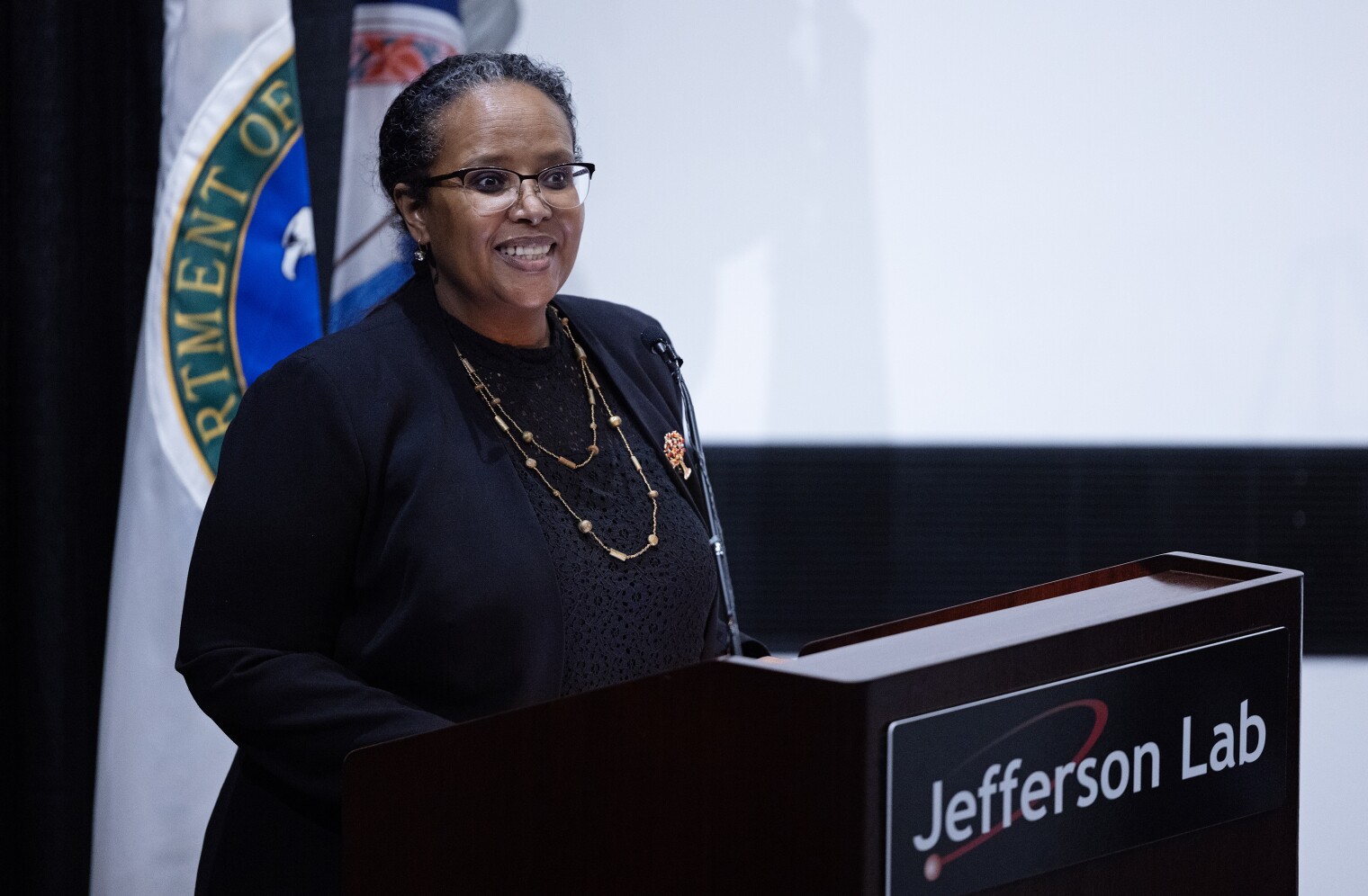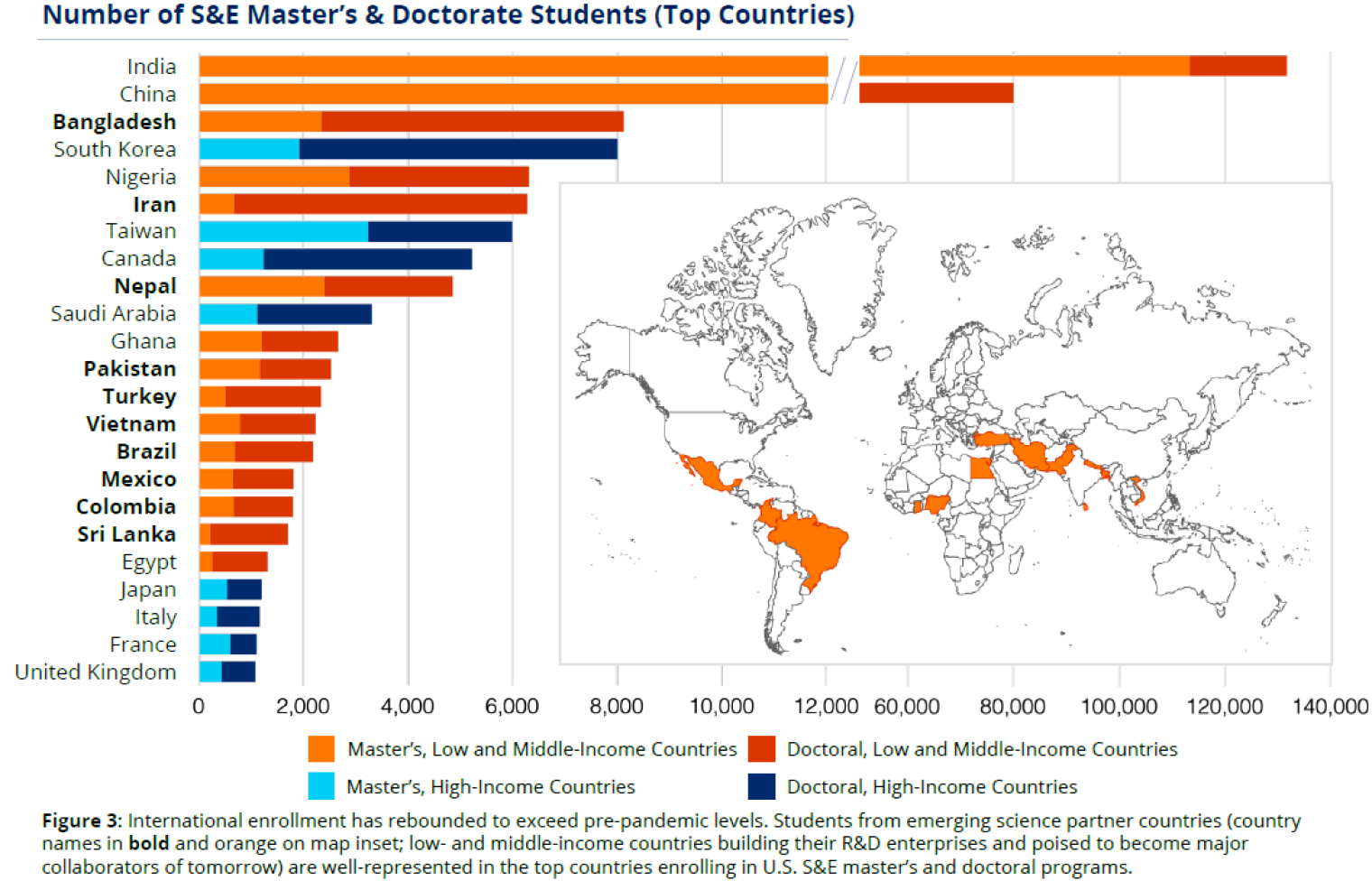| |
| FYI: Science Policy News from AIP |
| THIS WEEK |
|
|
|
|
|
|
| What’s Ahead |
 |
| DOE Office of Science Director Asmeret Asefaw Berhe speaks at an event held at Jefferson Lab. (Aileen Devlin / Jefferson Lab) |
DOE Science Head Berhe to Step Down
Asmeret Asefaw Berhe, head of the Department of Energy’s Office of Science, announced last week that she will depart the position on March 28 after almost two years in the role. Berhe will return to the University of California, Merced, where she holds a professorship in soil biogeochemistry. Among Berhe’s signature initiatives at DOE was to require grant applicants to submit plans describing how they will advance diversity, equity, and inclusion goals through their research projects. She also oversaw the rollout of two new major workforce diversity programs in the office, RENEW and FAIR. Highlighting such work in her departure message to office staff, Berhe wrote, “We worked to expand the STEM tent — tearing down longstanding barriers and forging new paths for people from all walks of life to enter and succeed in scientific careers.” Harriet Kung, one of the office’s two deputy directors, will fill Berhe’s role on an acting basis following her departure. Kung is a long-time civil servant in the office, which she joined in 2002 as a materials science program manager and later led its Basic Energy Sciences program from 2008 to 2020.
Granholm to Defend DOE Budget Request
Energy Secretary Jennifer Granholm will appear before the House Appropriations Committee on Wednesday to discuss the fiscal year 2025 budget request for the Department of Energy. The Biden administration is seeking to increase the budget for the DOE Office of Science by 4.2% to $8.58 billion, with particularly large boosts proposed for isotope production and advanced computing. Within DOE’s applied energy R&D portfolio, the Office of Energy Efficiency and Renewable Energy would increase 11.8% to $3.87 billion, while the Office of Nuclear Energy would drop 5.6% to $1.59 billion and the Advanced Research Projects Agency–Energy would drop 2.2% to $450 million. Within DOE’s National Nuclear Security Administration, the budget for Stockpile Research, Technology, and Engineering would drop 3.2% to $3.17 billion.
Strains in NASA Science Portfolio to be Explored by Science Committee
NASA’s Science Mission Directorate will be the focus of a House Science Committee hearing on Thursday. The directorate faces hard choices about which missions to prioritize in the wake of Congress’ decision this month to cut its budget by 5.9% to $7.33 billion for fiscal year 2024. The cuts fall almost entirely on the Planetary Science Division, which is shrinking 15% to $2.72 billion as NASA considers ways to rein in the costs of its flagship Mars Sample Return mission. Among those testifying Thursday are directorate head Nicky Fox and NASA’s acting inspector general George Scott, whose office recently published an audit of MSR. Also testifying are Jonathan Lunine, a professor of physical sciences at Cornell University who was a member of an independent review board that concluded MSR will likely cost billions of dollars more than anticipated, and Thomas Young, a former director of NASA’s Goddard Space Flight Center and a member of earlier independent review boards focused on MSR and the Psyche mission, respectively. Separately this week, Nicky Fox and other top space science officials will participate in the National Academies’ annual Space Science Week, which may shed further light on the implications of this year’s lackluster appropriations.
Fusion Advocates to Gather in DC for Annual Conference
Leaders in fusion energy policy and dozens of fusion executives are participating in the Fusion Industry Association’s annual conference this Wednesday and Thursday in Washington, D.C. House Science Committee Ranking Member Zoe Lofgren (D-CA) will provide remarks on Wednesday, and the event will conclude with a panel featuring the four co-chairs of the House Fusion Energy Caucus, Reps. Don Beyer (D-VA), Lori Trahan (D-MA), Jay Obernolte (R-CA), and Chuck Fleischmann (R-TN), the top House appropriator for the Department of Energy. The caucus recently celebrated the House’s passage of the Fusion Energy Act in February as part of broader legislation focused on accelerating deployment of advanced nuclear reactor technologies. The act would codify the Nuclear Regulatory Commission’s decision to develop a regulatory framework for fusion reactors that treats them under the licensing process used for byproduct material facilities such as particle accelerators rather than the more stringent licensing process used for fission reactors. At the conference NRC Chair Christopher Hanson will discuss this regulatory framework. which the agency aims to publish by the end of 2024 and put into effect by summer 2025. Also speaking at the event are DOE Deputy Secretary David Turk and DOE Fusion Energy Sciences head JP Allain, who will participate in a panel discussion on public-private partnerships with representatives from the UK, Japan, and Germany. Notably, the Biden administration has lowered its budget ambitions for the field, requesting $845 million for Fusion Energy Sciences in fiscal year 2025 rather than the more than $1 billion it sought last year.
|
|
| In Case You Missed It |
 |
| Chart illustrating the large number of science and engineering graduate students in the U.S. from China and India. The chart also displays enrollment figures from other countries that the National Science Board identifies as potential “emerging science partner countries.” (National Science Board) |
US Still Leads World in R&D Spending but Faces ‘Crisis’ in STEM Workforce, NSF Board Argues
The National Science Foundation’s biennial report on the state of U.S. science and engineering, published last week, found that the U.S. continues to spend more on R&D than any other country. The U.S. spent $806 billion, or 3.5% of its GDP, on R&D in 2021, the latest year for which data is available. By comparison, R&D spending was $668 billion for China, $177 billion for Japan, and $154 billion for Germany, the next three highest spenders. However, the report highlights that the U.S. is particularly dependent on STEM workers born outside the U.S. at a time when math test scores for U.S.-born elementary and secondary students are low, having dropped sharply during the pandemic. The U.S. STEM workforce consisted of 36.8 million people in 2021, and of these, 19% were born abroad, the report found. Foreign-born workers also accounted for 43% of all doctoral-level scientists and engineers in the U.S.
In a policy brief accompanying the report, NSF’s governing board argues that the U.S. now faces an “accelerating STEM talent crisis,” in part due to the longstanding underperformance of the U.S. pre-K-12 education system in comparison with many peer countries. Another vulnerability identified by the board is the U.S.’s outsized reliance on acquiring STEM workers from just two countries, China and India. Accordingly, the board recommends the U.S. rapidly ramp up efforts to increase the domestic STEM workforce as well as enact policies to attract and retain STEM talent from around the world. The board also suggests a new focus on recruiting from “emerging science partner countries,” defined as “low-and middle-income countries building their R&D enterprises that are poised to become the collaborators of tomorrow.”
Threat of Novel Tech Featured in Annual US Intelligence Report
Several science and technology developments pose growing and unpredictable national security threats to the U.S., according to the annual threat assessment report released last week by the Office of the Director of National Intelligence. “New technologies – particularly in the fields of AI and biotechnology – are being developed and are proliferating at a rate that makes it challenging for companies and governments to shape norms regarding civil liberties, privacy, and ethics,” the report states. The report conveys concern that these technologies could expand access to weapons of mass destruction and rapidly produce “asymmetric threats.” The report also warns of the potential that China could establish a technological lead over the U.S. that translates into economic and eventually military superiority. “Countries, such as China and the United States, that lead biotechnological breakthroughs in fields such as precision medicine, synthetic biology, big data, and biomimetic materials, will not only drive industry growth, but also international competition and will exert substantial influence over the global economy for generations,” the authors write. They also state that China “now rivals the United States in DNA-sequencing equipment and some foundational research,” and that by 2030 the country “probably will achieve world-class status in all but a few space technology areas.”
Priorities Proposed for Scientific Ocean Drilling Amid Uncertainty over US Commitment
The National Academies published a report last week identifying priority research areas for ocean drilling in light of the fact the National Science Foundation plans to end support for the aging drilling vessel JOIDES Resolution later this year due to its high operating costs. “With the absence of a dedicated drilling vessel supported by the United States, the capacity for future scientific ocean drilling for the United States and its present international partners will likely be reduced to approximately 10% of its current capacity,” the report warns. Scientific ocean drilling has historically increased understanding of climate change, plate tectonics, and led to the discovery of many microbes in ocean sediment, rocks, and fluids. Priority areas for future research identified in the report include “ground truthing climate change,” “evaluating past marine ecosystem responses to climate and ocean change,” “monitoring and assessing geohazards,” “exploring the subsea biosphere,” and “characterizing the tectonic evolution of the ocean basins.”
|
|
| Upcoming Events |
All events are Eastern Time, unless otherwise noted. Listings do not imply endorsement. Events beyond this week are listed on our website.
Monday, March 18
Tuesday, March 19
Wednesday, March 20
Thursday, March 21
Friday, March 22
Monday, March 25
Know of an upcoming science policy event either inside or outside the Beltway? Email us at fyi@aip.org.
|
|
| Opportunities |
|
Deadlines indicated in parentheses.
Job Openings
Solicitations
Know of an opportunity for scientists to engage in science policy? Email us at fyi@aip.org.
|
|
| Around the Web |
|
News and views currently in circulation. Links do not imply endorsement.
White House
Congress
Science, Society, and the Economy
Education and Workforce
Research Management
Labs and Facilities
Computing and Communications
Space
Weather, Climate, and Environment
Energy
Defense
Biomedical
International Affairs
|
|
|
| |
| This message is sent to you because your email address is on our subscribers list. To manage your FYI preferences and subscriptions, please click here . Or you can unsubscribe from all emails from AIP. AIP, 1 Physics Ellipse, MD 20740-3841
301.209.3100 - newsletters@aipcomm.org As a 501(c)(3) non-profit, AIP is a federation that advances the success of our Member Societies and an institute that engages in research and analysis to empower positive change in the physical sciences. The mission of AIP (American Institute of Physics) is to advance, promote, and serve the physical sciences for the benefit of humanity. |
|
| © 2024. American Institute of Physics |
|
|